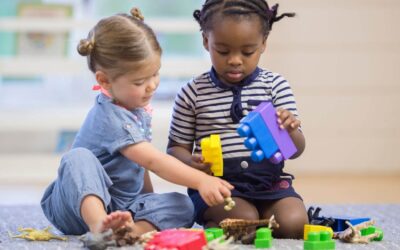What Are Social Skills in Childhood?
Social skills in childhood are the group of abilities your child needs to make friends.
Making friends, understanding social cues, and building strong relationships are essential skills for children to thrive in their social world. These abilities, known as social skills, are like building blocks that help children connect with others, resolve conflicts, and navigate social situations with confidence.
This article offers a warm and insightful look at social skills in childhood. We’ll explore the different stages of social development, discuss why these skills are so important, and provide you with practical strategies to support your child’s social journey.
Signs Your Child Might Need Support with Social Skills
Every child develops at their own pace, but here are some signs that your child might need some extra guidance with their social skills:
- Frequent conflicts: Often getting into disagreements or arguments with peers.
- Aggressive behaviors: Resorting to hitting, pushing, or other aggressive actions during social interactions.
- Difficulty making friends: Struggling to connect with other children or being excluded from social events.
- Challenges with perspective-taking: Having trouble understanding how others feel or seeing things from their point of view.
- Inflexibility: Wanting things their way or having difficulty adapting to different social situations.
- Disengagement: Seeming disconnected or uninterested in social interactions.
- Preference for solitary play: Choosing to play alone rather than with others.
The Building Blocks of Social Development: Stages and Milestones
Social skills develop gradually throughout childhood, with each stage building upon the previous one. Here’s a look at the key stages:
Stage 1: Presence and parallel play (toddlerhood)
- Presence: Learning to be comfortable around others and pay attention to them.
- Parallel play: Playing alongside other children, even if not directly interacting.
Stage 2: Interaction and conversation (preschool years)
- Interaction: Engaging in play with others, sharing toys, and taking turns.
- Conversation: Learning to have back-and-forth conversations, tell stories, and share information.
Stage 3: Empathy and intimacy (school-age years)
- Empathy: Understanding and sharing the feelings of others.
- Intimacy: Developing close and meaningful friendships.
Why Social Skills Matter
Social skills are not just about making friends; they are fundamental to a child’s overall well-being and success. Here’s why:
- Connection and belonging: Positive social interactions foster a sense of connection, belonging, and happiness.
- Emotional intelligence: Social skills help children develop emotional intelligence, allowing them to understand and manage their own emotions and empathize with others.
- Conflict resolution: Strong social skills equip children with the tools to navigate disagreements and resolve conflicts peacefully.
- Academic success: Research shows that children with good social skills tend to perform better academically.
- Future success: Social skills are essential for success in careers, relationships, and life in general.
Nurturing Your Child’s Social Skills: Tips for Parents
As a parent, you play a vital role in supporting your child’s social development. Here are some strategies to help your child build strong social skills:
- Find common interests: Encourage your child to participate in activities where they can meet other children who share their interests.
- Collaborate with the school: Work with your child’s teachers and school counselors to identify opportunities for social interaction and address any social challenges.
- Model and guide: Show your child how to interact positively with others. Teach them about social rules, social norms, and conflict resolution.
- Supervised playdates: Arrange playdates with one or two friends and provide guidance and support as needed. Keep the playdates short and structured, and end on a positive note.
- Start Small: If your child is hesitant in social situations, encourage them to “say something” and start with small interactions.
- Focus on quality over quantity: It’s okay if your child has a few close friends rather than a large social circle.
Social Skills at Different Ages: What to Expect
- Toddlers and preschoolers: Sharing information, engaging in parallel play, and starting to understand basic social rules.
- Kindergarten: Answering questions, sharing about themselves, and beginning to engage in more interactive play.
- Early elementary: Understanding appropriate conversation topics and developing friendships.
- Third grade: Forming close friendships and engaging in more complex social interactions.
- Middle school: Sharing confidences, understanding social cues, and demonstrating empathy.
- High school: Engaging in reciprocal conversations, reading nonverbal cues, and navigating complex social dynamics.
When to Seek Professional Support
If you’re concerned about your child’s social skills, don’t hesitate to seek professional help.
A child psychologist or therapist can assess your child’s social development and provide tailored support.
A Final Word on Social Skills in Childhood
Remember, every child is unique, and their social journey will unfold at its own pace.
By providing a nurturing and supportive environment, you can help your child develop the social skills they need to thrive in their world.
Book and web resources for social skills
Baker, Jed. (Retrieved 2017). Social skills books and resources for ASD.
http://socialskillstrainingproject.com/books.html
Barton, Erin. Educating Young Children with Autism Spectrum Disorders.
Berns, Roberta M. (2010). Child, family, school, community: Socialization and support.
Giler, Janet Z. (2000). Socially ADDept: A manual for parents of children with ADHD and/or learning disabilities.
Giler, Janet Z. (2011). Socially ADDept: Teaching social skills to children with ADHD, LD, and Asperger’s.
Madrigal, S., & Winner, M.G. (2008). Superflex. A superhero social thinking curriculum.
Ozonoff, Sally & Dawson, Geraldine & McPartland, James C. (2014). A parent’s guide to high functioning autism spectrum disorder: How to meet the challenges and help your child thrive.
Trawick-Smith, Jeffrey (2013). Early childhood development: A multicultural perspective.
UCLA PEERS Clinic https://www.semel.ucla.edu/peers
Books for kids
Eastman, P.D. (2003) Big Dog…Little Dog.
Brown, Laurie Krasny & Brown, Marc (2001). How to be a friend: A guide to making friends and keeping them (Dino life guides for families).
Cook, Julia (2012). Making friends is an art!: A children’s book on making friends (Happy to be, you and me).
Cooper, Scott (2005). Speak up and get along!: Learn the mighty might, thought chop, and more tools to make friends, stop teasing, and feel good about yourself.




